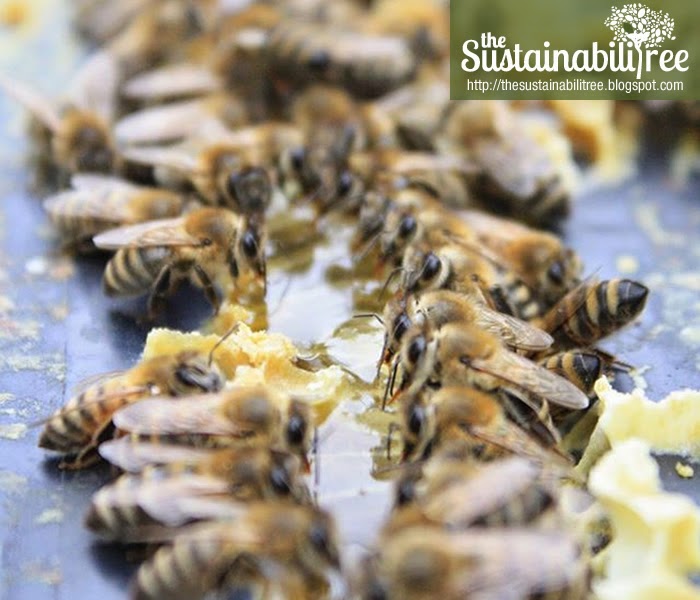So I know a guy, well actually he is a friend. And if you need the sweet stuff, he's got you covered. Last year Vince decided to start an apiary. He did some online research, spoke to a couple of people, and decided to order up some equipment and get going.
Fast forward to last week and there I am paying a visit to Vince's bees. I learned a couple of really interesting things about bees including one important thing that I didn't know: bees don't usually sting you unless you are directly in their flight path. (Also, they will attack you if you threaten them, try to kill them, or try to steal their honey, etc.)
This was a profound moment for me because I have always wanted to have an apiary on campus. But of course whenever someone brings up the idea of an apiary in a dense urban space, the first thing that comes to mind is the dreaded bee sting.
I watched Vince as he inspected the hive and added a bit of smoke to scare away some bees so he could open up the boxes and monitor the health of the colony. Up until the point that he was manipulating the honey combs, he didn't have any protective gear on at all. Later on his dad joined us as we were harvesting a little bit of honey and his dad didn't even wear a long sleeve shirt!
 |
| Vince stands directly beside his apiary with no protective clothing to examine his bees. |
I got a little more excited about the idea of bringing a hive on campus and asked Vince a couple of probing questions about what was needed to run a successful apiary. Despite his limited experience, he brought up several important factors to consider.
Food Source
Bees need a good source of food during the year, especially if they are going to build up their reserves for the winter. Fortunately they are resourceful and can exploit a lot of their surrounding environment. The uOttawa campus might be a good location because of all the flowering trees on and around campus, and the of course the many garden spaces on campus and in Sandy Hill.
Space
Turns out that bees don't actually need that much space if they have a ready supply of food. They are willing to travel up to 3 km for their food but only if needed. Spiking the campus with a few pollinator hot spots could be very helpful.
Aggression
Most variety of North American honey bees aren't that aggressive. They usually don't attack you unless they have a good reason, they usually don't swarm unless the hive is provoked, and they tend to keep to themselves. Lighter colour clothing seems to keep them calm.
Now I am super excited by the idea of some hives at uOttawa? Think of the potential for what it could do for the flowering plants on campus. But there are still a few things that would need to be worked out.
Bee stings
I was very satisfied with the idea that the bees were not aggressive. Nevertheless, if someone is allergic, we have to do something to make sure that they are safe on campus. Confining the hive to a secure location and relying on flowering trees for pollination would do a lot to keep human and bee populations separate. In the end, the potential of stings has to be taken seriously.
Harvesting honey
We will of course want to harvest some of the good stuff for the campus. We would have to probably do some testing of the honey before we use it. Maybe we would be able to sell some jars or offer them as gifts to visitors and dignitaries. Harvesting would require some experienced personnel to maintain the equipment and collect and process the honey.
Food Source
I mention this again because we need more food sources on campus. Even with all the trees and gardens available, more could be required. There would have to be some coordination with Grounds Services to plant more trees and flowers that would benefit honey bee production.
Education
We would also need to do some public outreach to inform people about bees, what their role is in our community and how to avoid mishaps. We would need the community to act as our eyes and ears to spot new nests popping up and warn us if they were dead bees in a particular space. Also, sharing information about what to do when someone is experiencing a severe allergic reaction to a sting could be beneficial to everyone.
What do think? Are bees a good idea on campus or is this a disaster waiting to happen? Have you ever thought about this idea and what do you think it would take to make it happen?









Comments